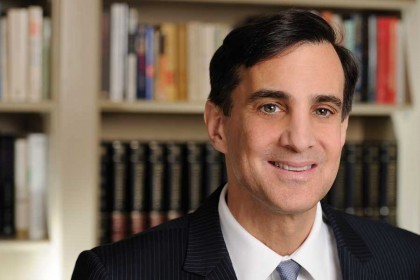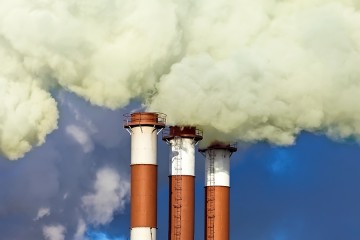Johns Hopkins University reaffirmed its commitment to sustainability and mitigating the effects of climate change today, joining 11 other leading research colleges and universities in pledging to advance the tenets of the Paris climate accord.

Image caption: Johns Hopkins University President Ronald J. Daniels
A statement from the group—which comes on the heels of last week's announcement that the United States would withdraw from the Paris Agreement—notes in part that "the scientific consensus is clear that the climate is changing largely due to human activity, that the consequences of climate change are accelerating, and that the imperative of a low carbon future is increasingly urgent."
The Paris Agreement, signed in 2015 by 174 countries and the European Union, is a global effort to lower global greenhouse gas emissions and minimize the effects of climate change. By withdrawing, the U.S.—the world's second-leading producer of greenhouse gases, behind only China—would be one of just three nations who are not part of the accord, along with Syria and Nicaragua.
The statement released today is signed by JHU President Ronald J. Daniels as well as the presidents of Brown, Columbia, Cornell, Dartmouth, Duke, Georgetown, Harvard, MIT, Penn, Stanford, and Yale.
"Universities have long had a special obligation to advance scientific inquiry and share the benefits of discovery," Daniels said. "In fulfilling this obligation, universities have identified the significant threats posed by climate change that require major, lasting changes in human activity at all levels.
"For Johns Hopkins, this includes not only further reducing our carbon footprint but also tapping our unique strength as a university to study and teach the impacts of climate change, and lift up innovative research into practices and technologies with the potential to slow and even reverse those impacts."
Johns Hopkins is working toward sustainability goals already in place, having committed in 2007 to reduce its greenhouse gas emissions by 51 percent by 2025. In 2015—the last full year for which data is available—the university's greenhouse gas emissions were down 30 percent from the 2007 baseline. A progress report on these efforts is expected to be released later this month.
In 2015, the university signed the Act on Climate Pledge, committing to increased energy efficiency; conservation of resources; and continued support of research in the fields of climate change, public health, energy, and sustainability.
The full statement issued today:
In 2015, we were proud to be among 318 institutions of higher education in signing the American Campuses Act on Climate Pledge, affirming our commitment to accelerate the global transition to low-carbon energy while enhancing sustainable and resilient practices on our campuses.
Today we reaffirm that commitment, which is consistent with the Paris Agreement and recognizes the concerted action that is needed at every level to slow, and ultimately prevent, the rise in the global average temperature and to facilitate the transition to a clean energy economy. Universities have a critical role to play in reducing our own greenhouse gas emissions; continuing to advance evidence-based understanding of the causes and effects of climate change on the environment, the economy, and public health; and developing solutions.
The scientific consensus is clear that the climate is changing largely due to human activity, that the consequences of climate change are accelerating, and that the imperative of a low carbon future is increasingly urgent. As institutions of higher education, we remain committed to a broad-based global agreement on climate change and will do our part to ensure the United States can meet its contribution.
Christina Paxson, President, Brown University
Lee C. Bollinger, President, Columbia University
Martha E. Pollack, President, Cornell University
Philip J. Hanlon, President, Dartmouth College
Richard H. Brodhead, President, Duke University
John J. DeGioia, President, Georgetown University
Drew Gilpin Faust, President, Harvard University
Ronald J. Daniels, President, Johns Hopkins University
L. Rafael Reif, Massachusetts Institute of Technology
Marc Tessier-Lavigne, President, Stanford University
Amy Gutmann, President, University of Pennsylvania
Peter Salovey, President, Yale University
For more information on sustainability efforts and initiatives at Johns Hopkins, visit the Office of Sustainability website.
Posted in University News, News+Info
Tagged sustainability, climate change









